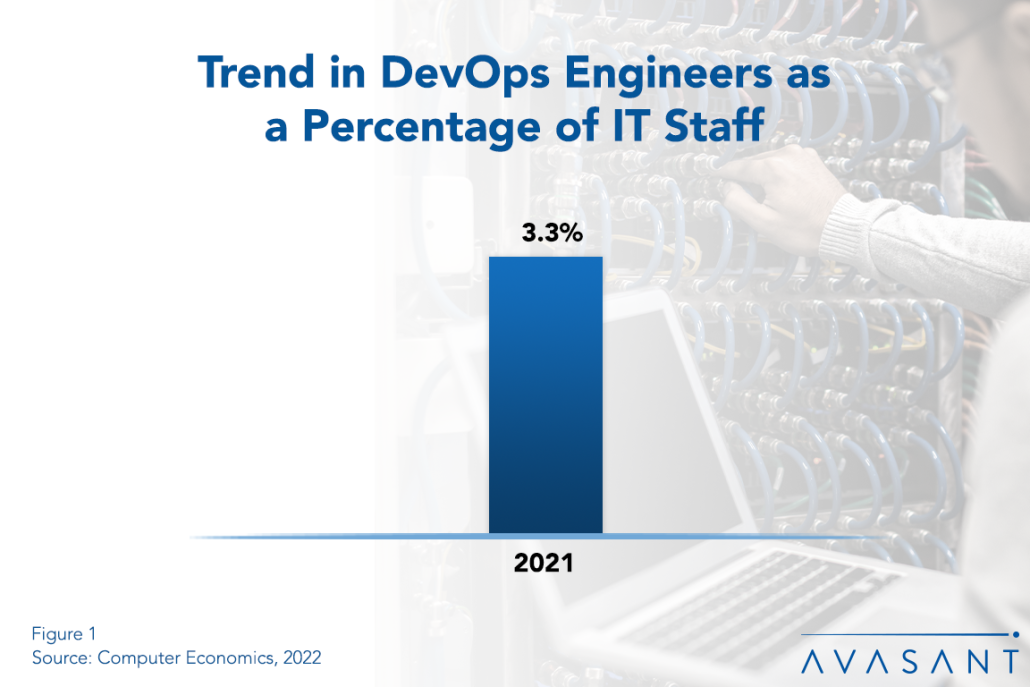DevOps is a natural extension of agile development into the deployment and operational phases of the system life cycle. It has been a way of life among modern cloud-native software developers, and it is starting to become popular within enterprise IT organizations as well, especially those that invest in custom software development. Yet, despite the trend toward DevOps, DevOps engineers are a small percentage of the total IT staff in enterprise IT organizations.
As shown in Figure 1 from our full report, DevOps Engineer Staffing Ratios, the DevOps engineer staffing ratio as a percentage of total IT staff is currently 3.3%. This is the first year that we have tracked DevOps engineers as a separate staffing role.

If DevOps is the way of the future, why is the staffing ratio so low? The first reason is definitional. Our definition of DevOps engineers refers to individuals who establish and maintain DevOps tools and processes along with various development, test, and production environments. It does not include software developers who merely use these tools. So, even in an IT organization where there is heavy software development, only a small percentage will be focused on setting up and maintaining the DevOps tooling and infrastructure.
Next, if an organization uses mostly off-the-shelf software, it is not economical to have a large number of development personnel, let alone DevOps engineers.
Additionally, it is difficult to fully apply DevOps principles with legacy systems and technologies, which are common in large companies. In legacy environments, teams often function in silos, and collaboration is at a minimum. It is not surprising that the staffing for DevOps engineers is quite low, as organizations may not have the need for DevOps engineers due to their business focus, types of software adopted, and systems and technologies that do not lend themselves to DevOps.
Even though staffing for DevOps engineers may be a small percentage, they are hugely influential in their role. The DevOps methodology is innovative, because of the collaborative energies and practices that bring people and tools together to ensure an effortless and continuous work product that delivers value efficiently, rapidly, and of the greatest quality. Therefore, in this digital era, digital transformation is not only affecting business structures but the ways in which businesses approach their product offerings. There is now a transition from a product-oriented to a customer-centric development model. With a customer-centric model, the focus is speed, quality, and personalization. A DevOps team is key to executing such a model, and DevOps engineers play a key role.
The trend toward DevOps is also accelerated by the trend for workloads to move to the cloud. This shift has been underway for the past two decades, and it is not yet complete as systems move to a truly cloud-native architecture. For organizations to fully benefit from such transformation, the DevOps approach is needed to support rapid development and deployment. Traditional on-premises systems might go months or even years between new releases. With cloud-native systems, changes are applied daily or even continuously. Only a DevOps approach can achieve this level of continuous integration/continuous delivery needed for cloud-native systems.
“DevOps engineering skills are in short supply these days,” said Tracell Frederick, research analyst/editor for Avasant Research, based in Los Angeles. “You can contract for those skills as a stop gap, but in the longer term, it is best to invest in your current employees and give a career path to those who want it.”
The full report provides metrics for benchmarking DevOps engineer staffing levels in the current environment. We provide four benchmarks by organization size and sector: DevOps engineering staff as a percentage of the IT staff, users per DevOps engineer, and applications per DevOps engineer. We conclude with recommendations on optimizing DevOps engineer staffing levels.
This Research Byte is a brief overview of our report on this subject, DevOps Engineer Staffing Ratios. The full report is available at no charge for subscribers, or it may be purchased by non-clients directly from our website (click for pricing).


